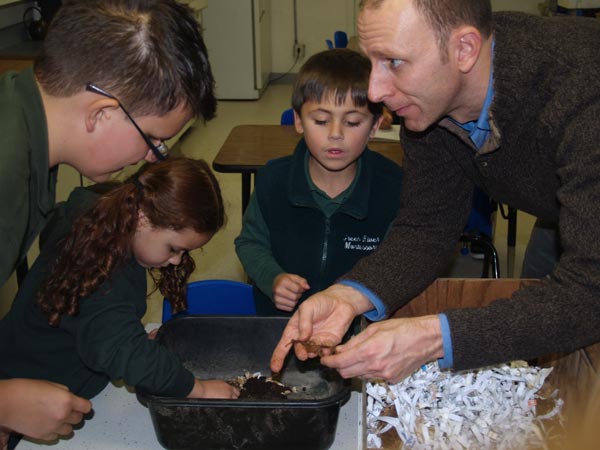Success story: Green River Montessori School
School Location: Auburn
Began participating in the Green Schools Program: November
2009
Level One of the Green Schools Program: Achieved in November 2010
Level Two of the Green Schools Program: Achieved
in July 2012
Waste reduction and recycling (level one)
- From 2009 to 2010, the school’s recycling rate increased from 43 percent to 62 percent.
- Food scraps and yard waste were composted off-site at a local farm. In 2010, the school started a worm bin for vegetable and fruit scraps.
- Recycling containers were placed in every classroom, office and break room, and the kitchen. Recycling stickers were affixed to each recycling container.
- All other recycling containers were placed next to garbage cans to increase visibility and convenience, and were emptied regularly.

- The school formed a Green School Team that consisted of staff, students and parent volunteers.
- With the help of a Green Schools Program representative, the team assessed what items in its garbage could be reduced, reused and recycled.
- To reduce paper use, teachers and staff limited the use of handouts and made double sided copies. The lunch menu was posted online and copies were only printed upon request.
- Office staff reduced excess newspaper deliveries and requested removal from vendor mail lists.
- Each year, the school saved and reused durable supplies.
- Maintenance staff mulched grass clippings into the lawn.
- The school promoted waste free lunches on Mondays and Fridays when students brought lunches from home. On those days, food scraps from each child’s lunch were sent home so that parents would know what their children had eaten that day and could then make adjustments in future lunches.
- Students used durable trays and utensils during lunch.
- In 2011, the school began to use durable cups for elementary school students. Juice and milk are purchased and served in bulk dispensers. The school also eliminated disposable parchment paper place settings during lunch and snacktime.
Energy conservation (level two)
- Students posted signs near light switches and electric equipment to remind students and staff to turn off lights, computers, and equipment when not in use.
- A student Energy Conservation Patrol turned off lights and shut down computers in the classrooms at the end of each day.
- The curriculum included learning about resource conservation and exploring how turning of lights impacts the environment.
- Monthly staff meetings and daily classroom reminders included energy conservation tips and practices.
- Staff, students and parents were informed about the school’s energy use during Parent Guild Meetings throughout the school year.
- Green River Montessori School used task lighting or day light when possible to conserve energy.
- After-school activities were consolidated in common areas to reduce electricity and heating and cooling needs in unoccupied areas.
- The school purchased energy efficient equipment.
Education and outreach
- In 2010, students participated in a King County Green Team worm bin workshop.
- Students, faculty and administrative staff were introduced to the school’s recycling and waste reduction policies, which were reinforced daily throughout the school and classrooms.
- Recycling and waste reduction news was communicated as needed in the monthly newsletter sent to students, faculty, staff and parents. Administrative staff and classroom teachers guided waste reduction and recycling practices.
- Elementary school students engaged in weekly field trips to the Auburn School District’s garden. The students learned about sustainability, organic gardening, composting, biology and science, nutrition and cooking.
For more information about the school’s conservation achievements and participation in the Green Schools Program, contact:
Dawn Norris, administrator
grms@comcast.net
Tina Layos-Knapp, director
grms@comcast.net


 Translate
Translate
